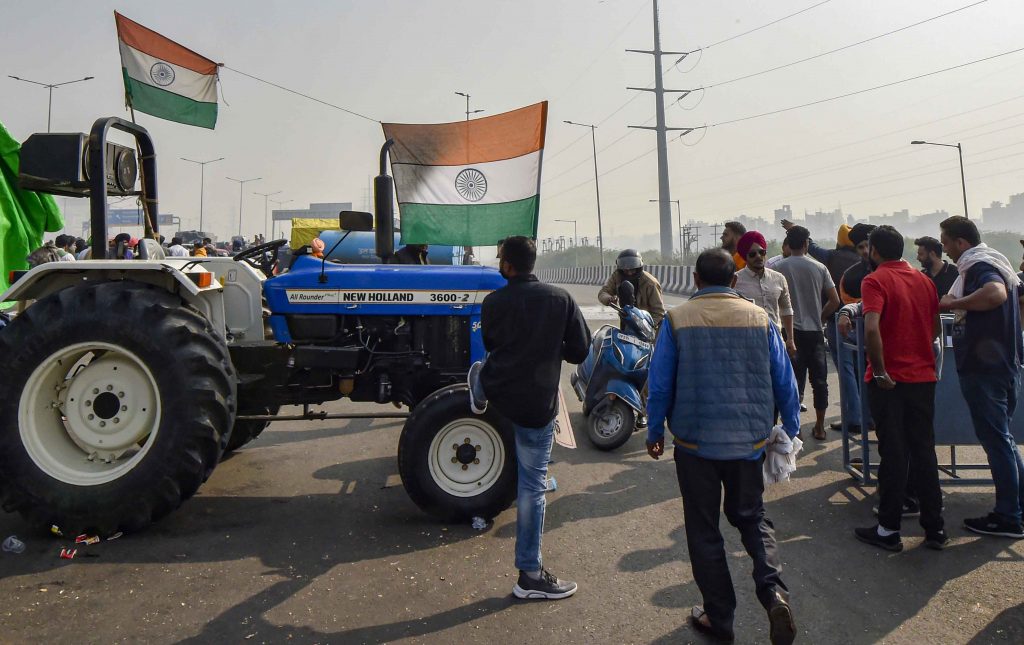New Delhi: As thousands of farmers continue to protest at various borders of the national capital demanding the repeal of three new farm laws, the government Wednesday proposed to give a ‘written assurance’ that the existing Minimum Support Price (MSP) regime for procurement will continue. Farmers have been saying that under the new laws, the MSP system will get abolished and they will be held at ransom by big corporates.
The government also proposed to make necessary amendments on at least seven issues, including one to allay fears about the weakening of the mandi system.
In a draft proposal sent to 13 agitating farmer unions, the government also said it is ready to provide all necessary clarifications on their concerns about the new farm laws enacted in September. However, the Centre it did not mention anything about the main demand of protesting farmers for the repeal of the laws.
Home Minister Amit Shah in Tuesday night’s meeting with 13 farmer union leaders had said the government would send a draft proposal on key issues raised by the farmers regarding the three farm laws, even though the meeting had failed to break the ice. The union leaders were adamant in repealing these laws.
Also read: Repealing of farm laws will end farmers’ protests: AIKS official
The sixth round of talks between the government and farm union leaders, which was scheduled for Wednesday morning, has also been cancelled.
In the proposal, sent by Agriculture Ministry Joint Secretary Vivek Aggarwal, the government said it is ready to consider with an open heart the objections which farmers have on the new farm laws.
“The government has tried to address the concerns of farmers with an open heart and with respect for the farming community of the country. The government appeals the Kisan unions to end their agitation,” it said.
On farmers’ fears that mandis would weaken after the new laws, the government said an amendment can be made wherein state governments can register the traders operating outside mandis. States can also impose tax and cess as they used in APMC (Agricultural Produce Market Committee) mandis on them.
On concerns that farmers may be duped as anyone having just a pan card is allowed to trade outside APMC mandis, the government said to rule out such apprehensions, the state governments can be given the power to register such traders and make rules keeping in mind the local situation of farmers.
On the issue of farmers not getting the right to appeal in civil courts for dispute resolution, the government said it is open to making an amendment to provide for an appeal in civil courts. Currently, the dispute resolution is at SDM level.
The government also spoke on the farmers’ issue regarding big corporate houses. On fears that big corporates will take over farmlands, the government said it has already been made clear in the laws, but still, for clarity’s sake, it can be written that no buyer can take loans against farmland nor any such condition will be made to farmers.
The government also tried to allay fears of farmers regarding MSP. The government said it is ready to give a written assurance that the existing MSP will continue. On demands to scrap the proposed Electricity Amendment Bill 2020, the government said there won’t be any change in the existing system of electricity bill payment for farmers.
The draft proposal has been sent to 13 farm union leaders including Joginder Singh Urgrahan of BKU (Ekta Ugrahan), one of the biggest among nearly 40 agitating unions.
“Farmer unions have received the draft proposal from the government,” Bharatiya Kisan Union (BKU) national spokesperson Rakesh Tikait told this agency. He is one of the many union leaders participating in the ongoing negotiations with the government.
The government has proposed seven amendments in the two new laws – The Farmers Produce Trade and Commerce (Promotion and Facilitation) Act, 2020 and The Farmers (Empowerment and Protection) Agreement of Price Assurance and Farm Services Act, 2020. However, it has not touched The Essential Commodities (Amendment) Act, 2020 at all.
